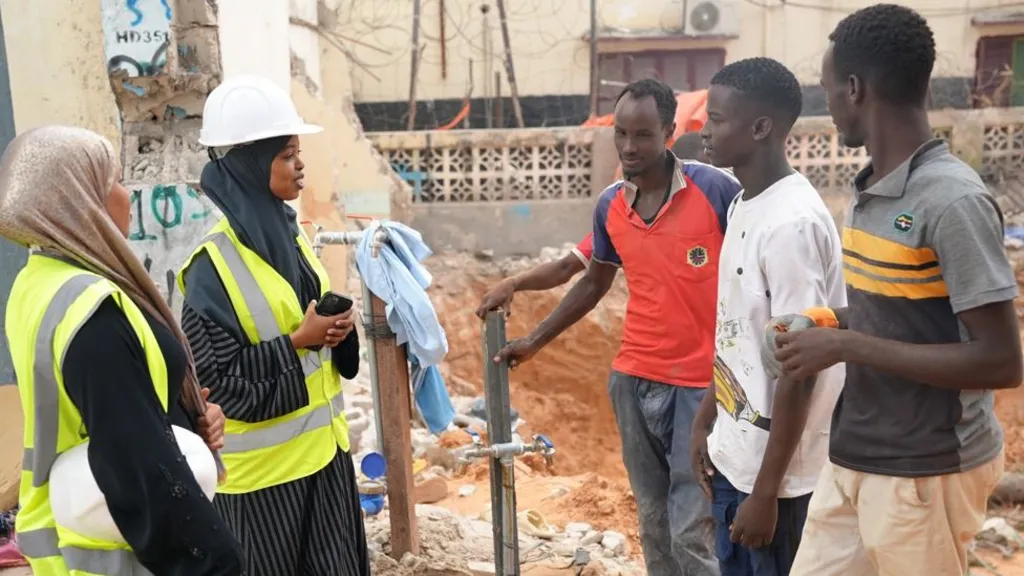Mogadishu, Somalia’s capital, is witnessing a remarkable construction boom as the city emerges from decades of conflict. Amid this transformation, two young female engineers, Fathi Mohamed Abdi and Saadia Ahmed Omar, are challenging gender stereotypes and playing key roles in rebuilding the city’s infrastructure. At just 24 years old, both women have already overseen more than 30 multimillion-dollar construction projects, including a 10-storey apartment complex in the Hodan District’s Taleh area.
Wearing hard hats and confidently directing teams of male workers on bustling construction sites, Ms. Abdi and Ms. Omar represent a new generation of Somali professionals committed to restoring the city’s vibrancy. Ms. Abdi, the Chief Operating Officer of Arkan Engineering Services, recalls the skepticism she faced at the start of her career: “People would ask, ‘How can we trust a house built by a woman?’” Today, her projects speak for themselves.
Growing up in a war-torn Mogadishu, both women were shaped by the chaos around them. Unlike many of their peers who fled the country, they remained determined to contribute to Somalia’s recovery. “When I was young, this city was in chaos. Now, we are part of its reconstruction,” says Ms. Omar. The post-conflict reconstruction has created a massive demand for skilled engineers, and in a country where women make up just 5% of the engineering workforce, this demand is slowly opening doors for women.
According to the Somali Engineers Association, more than 6,000 buildings have been constructed in Mogadishu over the past five years. This surge, driven by improved security and massive diaspora investment, has transformed the skyline. The association encourages women to pursue careers in engineering to help meet the growing demand and bring diverse perspectives to the industry.
Despite these strides, challenges persist. Internships are difficult for women to secure, mentorship is rare, and gender bias remains entrenched. Ms. Omar recalls searching for three months before any company would accept her for training. Still, she and Ms. Abdi have not only broken through the barriers they’ve become some of Mogadishu’s most respected engineers.
The boom, however, is not without controversy. While modern buildings and commercial complexes continue to rise, some worry that Mogadishu’s historical charm is being lost. Veteran architect Siidow Cabdulle Boolaay laments the disappearance of the city’s classical Italian-style architecture and raises concerns about the safety and quality of some new constructions. Issues such as the use of salty coastal sand for cement and a lack of fire safety measures have been highlighted.
Regulations to improve quality control were introduced only three years ago. Salah Hassan Omar, spokesperson for the mayor of Mogadishu, acknowledges the past gaps but insists that construction is now regulated, with laws in development to define where high-rise buildings can be erected. Still, the pace of construction often makes thorough oversight difficult.
Ms. Abdi and Ms. Omar affirm that all their projects comply with municipal guidelines and that they are committed to quality. Both women are graduates of Plasma University Mogadishu’s civil engineering program and see their work as more than just a job; they see it as nation-building.
In addition to safety concerns, the rapid urbanization of Mogadishu presents environmental challenges. The lack of a sewage system, unchecked borehole drilling, and growing population density are putting immense pressure on the city’s fragile infrastructure. Climate and environmental experts warn that without coordinated planning, the boom could lead to long-term ecological damage.
Still, the mood among the city’s engineers is hopeful. Despite ongoing threats from the Islamist group al-Shabab, construction continues, and the profession is experiencing a revival after decades of stagnation. As Mr. Ibrahim Abdi Heyle, chairman of the Somali Engineers Association, puts it, “Our dreams did not stop because of explosions. Today, we are reviving a profession that collapsed 30 years ago.”
Both Ms. Abdi and Ms. Omar remain optimistic. “We are not just building structures; we are building hope,” says Ms. Omar. Ms. Abdi adds, “We are proving that women can not only design buildings but also lead major projects and shape the future of our city.” With each new high-rise they help construct, these two engineers are not just reshaping Mogadishu’s skyline they are redefining what is possible for women in Somalia.













Leave a comment